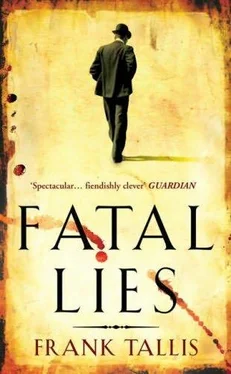Frank Tallis - Fatal Lies
Здесь есть возможность читать онлайн «Frank Tallis - Fatal Lies» весь текст электронной книги совершенно бесплатно (целиком полную версию без сокращений). В некоторых случаях можно слушать аудио, скачать через торрент в формате fb2 и присутствует краткое содержание. Жанр: Исторический детектив, на английском языке. Описание произведения, (предисловие) а так же отзывы посетителей доступны на портале библиотеки ЛибКат.
- Название:Fatal Lies
- Автор:
- Жанр:
- Год:неизвестен
- ISBN:нет данных
- Рейтинг книги:3 / 5. Голосов: 1
-
Избранное:Добавить в избранное
- Отзывы:
-
Ваша оценка:
- 60
- 1
- 2
- 3
- 4
- 5
Fatal Lies: краткое содержание, описание и аннотация
Предлагаем к чтению аннотацию, описание, краткое содержание или предисловие (зависит от того, что написал сам автор книги «Fatal Lies»). Если вы не нашли необходимую информацию о книге — напишите в комментариях, мы постараемся отыскать её.
Fatal Lies — читать онлайн бесплатно полную книгу (весь текст) целиком
Ниже представлен текст книги, разбитый по страницам. Система сохранения места последней прочитанной страницы, позволяет с удобством читать онлайн бесплатно книгу «Fatal Lies», без необходимости каждый раз заново искать на чём Вы остановились. Поставьте закладку, и сможете в любой момент перейти на страницу, на которой закончили чтение.
Интервал:
Закладка:
The sound of a voice floated above the traffic. The doorman had come out from beneath the loggia and was waving his hands in the air. Liebermann acknowledged his presence and walked toward the lobby. When he arrived, two men were emerging. The first was taller than the second. His thick dark hair was combed to the side and his beard was neatly trimmed. He wore spectacles, a fine gray suit, and a necktie loosely set to produce a wide knot. The second man was small and wiry, but his face was distinguished by an exceptionally high forehead and a strong, square chin. His hair-which was thinning a little-was brushed back and slightly bristled. He wore spectacles similar to the first man's, a dark jacket, and a white bow tie. Liebermann noticed that his gait was rather unusual: somewhat jerky and uneven.
The first man was Alfred Rose. The second was Rose's brother-in-law, Director Mahler. Although Liebermann had been waiting to address the first, the mere presence of the second made his step falter. For Liebermann, Director Mahler was only slightly less than a god.
“Concertmaster?” Liebermann called hoarsely. Rose didn't hear him, and the young doctor had to call again. “Concertmaster?”
The violinist stopped and turned. “Yes?”
“Herr Rose, I have a message… from one of your pupils.”
Rose didn't respond, but simply looked at his interlocutor inquisitively. Liebermann noticed that Mahler's right leg was twitching. This movement suggested impatience, but his expression was perfectly calm. The director finally stamped the ground lightly, and the twitching stopped.
“Fraulein Novak?” Liebermann added.
“Who did you say?”
“Fraulein Novak.”
“I'm sorry” said the concert master, shaking his head. “You must have been misinformed. I have no pupil called Novak.”
It was the answer that Liebermann had expected: but he wanted to make absolutely sure that later there would be no room for doubt in his mind.
“A Hungarian lady” he persisted. “She recently sought your advice on the spring sonata?”
Rose shook his head again-this time more vigorously. “No, my friend. You really do have the wrong person.”
“So it seems… Forgive me.”
Liebermann bowed, and the two men walked on. Mahler immediately began talking.
“I've agreed to the guest engagements-and Salter has confirmed that at least one of my works is to be included in every program.” In spite of his severe features, the director spoke cheerily.
“And the fee?” asked Rose.
“I said I wouldn't accept less than two thousand kronen.”
“Two thousand,” repeated Rose, impressed.
As they receded, their voices faded beneath the clatter and thrum of the Ringstrasse traffic.
Liebermann's attention was drawn upward. A dark cloud was floating over the roof of the opera house.
73
Eichmann placed the letter in front of him-a carefully executed, fastidious movement. He took care to ensure that the upper horizontal line of the paper was exactly parallel with the edge of his desk, let his finger run over the embossed seal, and took a deep breath.
“From the minister of education.”
Gartner took a swig from his hip flask. “I see.”
“He is going to attend the next meeting of the board of governors. He wishes to raise a number of issues.”
“Issues?”
“The minister makes several allusions to the emperor's desire to create a more inclusive military-and he writes of the moral obligation incumbent upon educational institutions to respect His Majesty's wishes. The implications, I'm afraid, are all too clear.”
“Headmaster? Are you suggesting that…”
“I will almost certainly be asked to tender my resignation. And so-I am sorry to say-will my closest allies.”
“We must fight them!” said Gartner. “We must argue our case.”
Eichmann leaned forward and ran his finger down the margin of the letter.
“Listen to this: Young minds are easily misguided, and great care must be taken to ensure that any philosophical instruction given in military schools is concordant with, the emperor's vision. It is over, my friend.”
Gartner took another swig. “The ingratitude, headmaster.”
“I have given the best years of my life to this school.”
Gartner pulled his gown around his shoulders, as though he had suddenly felt the temperature drop in his old bones.
“Was it Wolf?”
“He wrote a letter to his uncle-the commissioner of the security office.”
“And have you spoken with him? The boy?”
“He sat where you are now, straight-faced, explaining to me how he felt he had been manipulated, corrupted. How he had been mesmerized in your special tutorial group-made to believe things through relentless repetition-that he now understands were disloyal to the emperor… not in sympathy with the spirit of an empire comprised of so many great and proud nations.”
“Disgraceful. And he seemed such a receptive boy-so full of promise. Did we teach him nothing?”
Eichmann smiled: a humorless display of teeth.
“No. You are mistaken, old friend,” said the headmaster. “I fear we taught him too much.”
74
The circle of trees looked different by daylight, and Drexler was uncertain whether he had brought the constable to the right place.
“Just a moment,” he said, pausing to consider the landscape.
Drexler went over to a large gnarled trunk, and ran his fingers over the rough surface.
“What are you doing?” the constable called out.
“Looking for something.”
The face was less distinct than Drexler had remembered-but it was there nevertheless. An old graybeard, trapped in the timber: two knotty projections serving to create the illusion of a pair of weary, anguished eyes.
“Here,” said Drexler, pointing at the ground. “I buried him here.”
The constable marched over, swinging the shovel off his shoulder. He stamped the blade into the ground and angled it back, raising a wedge of turf. The ease with which the soil came up was conspicuous, suggesting recent disturbance. The constable grunted, and set about his task with renewed conviction. He was a strong, big-boned youth, and he tossed the earth aside with mechanical efficiency.
“Why did you do it?” he asked Drexler.
“It was an accident,” Drexler replied. “We were playing with a revolver… and it just went off. I didn't mean to do it.”
“If it was an accident, why didn't you tell the headmaster? Accidents happen…”
“I don't know. I panicked, I suppose.”
“And you carried him-the dead boy-all this way on your own?”
“No. I stole a horse and trap and got as far as the road.”
“That's odd. None of the locals reported a theft.”
“It belonged to the school. I returned the trap before anyone noticed it was missing.”
The constable shrugged, took off his spiked helmet, and handed it to Drexler. Then he wiped his brow and continued to dig. Gravid clouds had begun to gather overhead, and Drexler felt the first faint chill of rain on his cheeks. The hole deepened-but there was no sign of Perger's jute shroud.
“How far down did you bury him?”
“Not that far,” said Drexler, perplexed. “You must have just missed him… Try here.” He pointed to another spot.
The constable sighed, moved a little closer to the tree, and began to dig again. He interrupted his task to look up at the malignant sky.
“We're going to get soaked,” he said, swearing softly under his breath.
The shovel's blade met some resistance, and the constable caught Drexler's eye. However, the next downward thrust produced a loud clang that identified the obstruction as nothing more than a rock. Soon the constable had dug another hole, equal in depth to the first.
Читать дальшеИнтервал:
Закладка:
Похожие книги на «Fatal Lies»
Представляем Вашему вниманию похожие книги на «Fatal Lies» списком для выбора. Мы отобрали схожую по названию и смыслу литературу в надежде предоставить читателям больше вариантов отыскать новые, интересные, ещё непрочитанные произведения.
Обсуждение, отзывы о книге «Fatal Lies» и просто собственные мнения читателей. Оставьте ваши комментарии, напишите, что Вы думаете о произведении, его смысле или главных героях. Укажите что конкретно понравилось, а что нет, и почему Вы так считаете.












